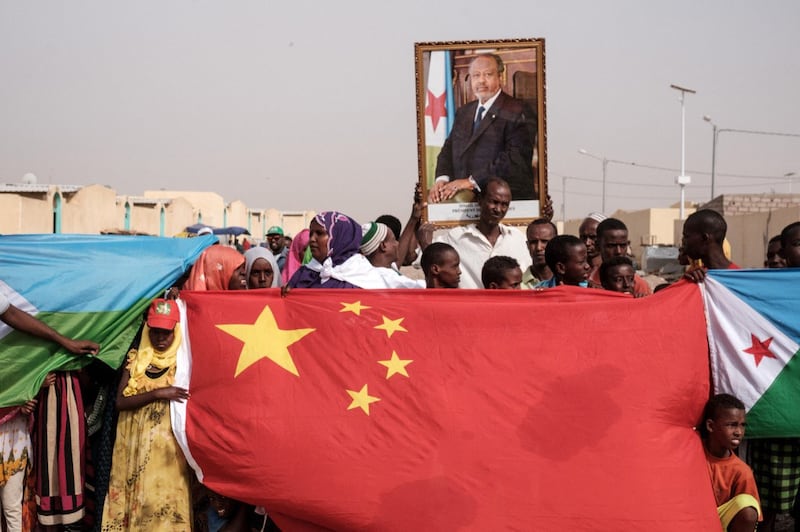China is building a new military port on Africa’s Atlantic coast.
The port at Bata in the Central African nation of Equatorial Guinea is set to become China’s first permanent military presence on the coast of West Africa.
U.S. officials told The Wall Street Journal that this meant that Chinese warships might be able to rearm and refit in a location opposite to the east coast of the United States.
The new Chinese naval base would be located nearly 10,000 kilometers, or 6,000 miles from Washington. But American officials have shown concern over it.
In October, the U.S. government sent a senior national security adviser to the tiny oil-producing country of Equatorial Guinea to call on officials there to resist China’s overture. It appears that he didn’t succeed.
Meanwhile, The Economist magazine said that “The Gulf of Guinea would be a logical place to look for a base.”
“Piracy is a scourge there,” it said. “So China could plausibly argue that its help is needed.”
And, according to the magazine, the family-run dictatorship in Equatorial Guinea “happens to be the sort that China is well practiced at doing business with in Africa: brutal, corrupt, and a financial shambles.”
In recent years the U.S. and its allies have confiscated allegedly ill-gotten luxury assets from Equatorial Guinea’s vice president Teodoro Nguema Obiang Mangue. The proceeds are used to fund COVID-19 vaccines and other medical assistance for the country.

'More adventurous'
Five years after building its only overseas base in Djibouti on the Horn of Africa on Africa’s east coast, Djibouti has remained until now the Chinese armed forces only overseas bastion.
Ryan Martinson of the U.S. Naval War College in Newport, Rhode Island, provides some useful background.
Chinese military analysts, he says, have openly advocated “pushing into waters far from home to divert American attention and resources from Chinese waters.”
Martinson cites a book by Hu Bo of Peking University, in which Hu acknowledges that China’s Navy couldn’t compete with America for supremacy in faraway seas.
But Hu suggests that China could “pin down” some American forces that might otherwise be sent to East Asia.
Martinson also cites Liu Zhe, the captain of China’s first aircraft carrier, the Liaoning, who wrote in an essay in 2017 that “the farther away we are from our territorial sea, the more secure will be the motherland behind us.”
The Economist says that China is “becoming a more adventurous naval power,” amassing more ships, though not more tonnage, than the U.S. Navy.
But most of these vessels keep to Indo-Pacific waters.
When China began building its first overseas base in 2016 in Djibouti on the Horn of Africa, Chinese officials tried to allay Western anxiety about their country’s expanding military presence.

Debt buildup
They said that the Djibouti base was built only for “supporting multinational anti-piracy efforts, helping to secure vital shipping lanes, and enabling China to protect its citizens in the region.”
In 2011, the Chinese Navy helped to conduct an evacuation of some 30,000 Chinese citizens from Libya as that North African country descended into civil war.
But in Kenya to the south of Djibouti, local citizens worry about the dangers of oil spills, the inevitable accidents that the Chinese Navy might bring, and the costs of financing a new port and railroad there.
According to a foreign journalist living in Kenya, critics there say that Kenya “has sold its soul to China and is wallowing in debt that it won’t be able to pay back.”
Meanwhile, China’s commitment to offering economic and financial aid to a number of African countries appears to have its limits.
According to the Financial Times, experts are concerned about African nations’ ability to repay Chinese loans.
Apparently with this in mind, China has announced plans to cut loans provided to those nations by a third over the next three years.
In a recent video address to the triennial Forum on China-African Cooperation being held in Senegal, China’s President Xi Jinping pledged to provide $40 billion to African states in investments, credit lines, trade financing, and special drawing rights.
Although that represents a cut from the $80 billion pledged at the previous two summits, Xi emphasized his commitment to what he called a “win-win situation.”
Dictating terms
Meanwhile, Chidi Odinkalu, senior manager for Africa at the Open Society Foundations, criticized some African governments for relying too heavily on loans from China.
“China’s strategic objective was to get a foot in the door,” he said “Now that it’s in the door, it can choose to dictate the terms.”
The International Monetary Fund (IMF) says that debt ratios in Sub-Saharan Africa have been rising in part due to the COVID-19 pandemic.
This is creating debt distress in countries that were already suffering from negative financial conditions.
Africa has witnessed an estimated 214,000 deaths as well as drastic economic effects due to COVID-19.
As Africa’s largest bilateral creditor, China holds more than 20 percent of African debt.
And payments to China account for nearly 30 per cent of 2021’s debt service. Angola alone accounts for almost a third.
The Centre for the Study of Economies in Africa reports that at least three factors drove the debt crisis—a global recession in the early 1980s, the rise in interest rates in developed countries, and a decline in new capital inflows.
According to the Washington-D.C. –based Brookings Institution, as of 2018, 19 African countries have exceeded the 60 percent debt-to-GDP threshold set by the African Monetary Cooperation Program for developing countries.
Meanwhile, 24 countries have exceeded the 95 percent debt-to-GDP rates suggested by the IMF.
Surpassing that threshold means that these countries are highly vulnerable to economic changes while their governments have a reduced capacity to provide support to their economies in the event of a recession.
Dan Southerland is RFA's founding Executive Editor.
